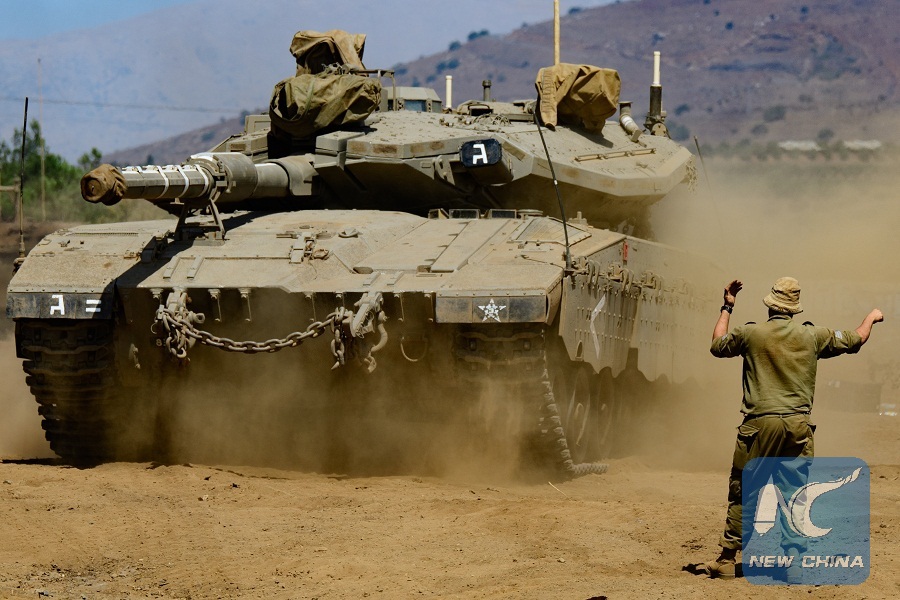Conflict between Israel and Syria triggered by stray shells appears to have been contained. (Xinhua Photo)
JERUSALEM, Oct. 24 (Xinhua) -- After a tense weekend in which Syria fired five rockets into Israel and the Israeli military retaliated, it appears the violence on the border is being contained.
There were no injuries or damage from the shooting on the Israeli side. Syrian media reported damages from the Israeli strike on military artillery positions.
On Monday, Israel's Defense Minister Avigdor Liberman blamed the Lebanon's Hezbollah group for the incident, although the Israeli military did not confirm this.
According to a report on Israeli Channel 2, there was no fighting going on at the time within Syria, lessening the likelihood of more shells into Israel.
If that is the case, the incident was the first of its kind since the Syrian civil war began 6 years ago.
Throughout the Syrian civil war which has been ongoing in recent years, there have been numerous incidents of shells fired between rivaling factions in the country that landed on the Israeli side of the border.
Israel has made its policy to respond to every fire towards its northern part of the territory, whether intentional or not, claiming a breach of its sovereignty.
Hezbollah has been an active member in the civil war, helping Assad stave off stubborn rivals.
Last weekend's exchange came days after the Syrian army fired at Israeli planes that were flying over Lebanon. The planes were unharmed, but the military struck back at an anti-aircraft battery.
Israeli Prime Minister Benjamin Netanyahu said the attempt was "unacceptable," and he vowed that Israel "would continue to operate in the area in order to protect ourselves."
Israel captured the Golan Heights from Syria during the 1967 Mideast war.
The international community does not recognize Israel's hold over the territory but has largely acquiesced its knee-jerk military response to every spill-over incident.
According to Dr. Shaul Shay from the Begin Sadat Center for Strategic Studies and Former deputy head of the Israel National Security Council, the Israeli policy has not changed, while things in Syria have.
"The other players are attempting to define new rules in the arena. Israel has maintained a very consistent policy, it has not changed in recent years," Shay tells Xinhua in an interview.
While the events of recent days have thus far not escalated further, the potential exists.
"Israel is taking calculated risks and until now has been successful in doing so," Shay adds.
The Syrian-Lebanese arena has become increasingly complicated. Syrian President Bashar al-Assad is battling several combatant factions attempting at overthrowing his regime. The increased Russian presence in recent months on behalf of Assad has Israel treading more carefully.
The Israeli Prime Minister's office has said there is close coordination between Israel and Russia in order to avoid any incidents above Syrian and Lebanese airspace.
Israeli military planes fly frequently over Lebanon on intelligence missions and at times in order to carry out airstrikes targeting the militant Hezbollah organization.
Hezbollah and Israel fought a war in 2006.
"For Israel, one of its red lines is to prevent Hezbollah or Iran from fortifying its position in Syria," Shay tells Xinhua.
But all the parties involved in the Syrian strife are deeply entrenched in it. This leaves Israel with a relatively free hand, within the limits of the unwritten rules of the conflict, to retaliate if and when it sees fit.
According to Dr. Shay, an escalation now would "stir things up" and is too risky for any of the sides. The wild card is Iran.
"If there will be a very serious escalation in the Iranian-American conflict, Iran might have in interest in signaling to the US that increased pressure may lead Iran to ignite the Middle East," is Shay's assessment.
U.S. President Donald Trump is urging Congress to de-certify the Iranian nuclear agreement, a move that may back Iran into a belligerent corner.
For now, the isolated incidents and controlled fire are kept under control by all sides, with each carefully maintaining the delicate balance. This can change very quickly.


